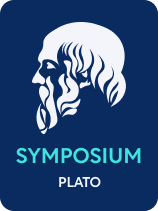

This article is an excerpt from the Shortform book guide to "Symposium" by Plato. Shortform has the world's best summaries and analyses of books you should be reading.
Like this article? Sign up for a free trial here .
Are you looking for Symposium Plato’s quotes? What are some of the most noteworthy passages worth revisiting?
Plato’s Symposium tells the story of a group of Athenian men at a party all giving speeches in praise of love. Their speeches and discussions quickly lead them to try and answer the question, “What is love?” Plato explores this question through the different characters in attendance, and in the process explains the connection between love and philosophy.
Below is a selection of quotes from Plato’s Symposium.
Plato’s Symposium on Love
What is love? How does love connect to philosophy? How can it lead to human happiness?
The ancient Greek philosopher Plato addresses these questions and more in his Symposium, a work which claims that passionate desire, rather than cold and detached analysis, drives philosophy. The Symposium also provides insight into Plato’s views on happiness, education, and reproduction.
The following Symposium quotes by Plato highlight some of the key ideas:
“Love is of something, and that which love desires is not that which love is or has; for no man desires that which he is or has. And love is of the beautiful, and therefore has not the beautiful. And the beautiful is the good, and therefore, in wanting and desiring the beautiful, love also wants and desires the good.”
According to Diotima, people love what they don’t have: Loving an object means desiring it, and nobody would desire something they already have. If someone says they love something they have, it actually means they desire to continue having it.
“The truth about eros is terrifying.”
According to Diotima, Eros is not beloved, but rather is a lover—one that desires and seeks out beautiful things. Instead of a soft, youthful, and beautiful god, Eros is an old, tough, and hardened spirit. He acts as a messenger between the humans and gods, delivering human prayers and offerings to the gods and divine instructions or blessings to humans. Diotima outlines four things that Eros is not:
- Eros is not beautiful: Eros desires beauty, and people desire what they don’t have. Therefore, Eros isn’t beautiful.
- Eros is not good: All good things are beautiful—that’s why they’re attractive. Since Eros desires beauty, it follows that he desires good as well and therefore is not good himself.
- Eros is not wise: Wisdom is a good and beautiful quality, so Eros must desire it—and, therefore, lacks it.
- Eros is not a god: Gods are perfect beings that lack nothing—since Eros lacks beauty, goodness, and wisdom, it follows that he isn’t a god.
“Love’ is the name for our pursuit of wholeness, for our desire to be complete.”
Aristophanes tells a wild story proposing that love allows a person to complete themselves: Humans used to be two people in one, fused back to back. However, they became arrogant, and the gods split them in half as a punishment. Now, love and sex are human attempts to return to that previous combined, “whole” state. From this story, Aristophanes draws three main conclusions:
- People have “soulmates.” Aristophanes suggests that everyone still has their other half in the world somewhere, and they are perfect for each other.
- Love is the desire to become whole. What people experience as love is actually just their desire to become whole again. This is why soulmates that find each other will stay together for their entire lives—it’s as close they can get to being whole again.
- Homosexuality (among men in particular) is natural and moral. Aristophanes claims that some of the dual-humans were pairs of two women or two men—and so their love results from the same divine “split” that created heterosexuality. In addition, Aristophanes suggests that homosexual men are more courageous and manly—and therefore more moral—than heterosexual men because they’re attracted to those traits in others as well.

———End of Preview———
Like what you just read? Read the rest of the world's best book summary and analysis of Plato's "Symposium" at Shortform .
Here's what you'll find in our full Symposium summary :
- Plato’s philosophies on love, happiness, education, and reproduction
- Agathon’s description of Eros, the god of love
- What it means to love beauty itself






